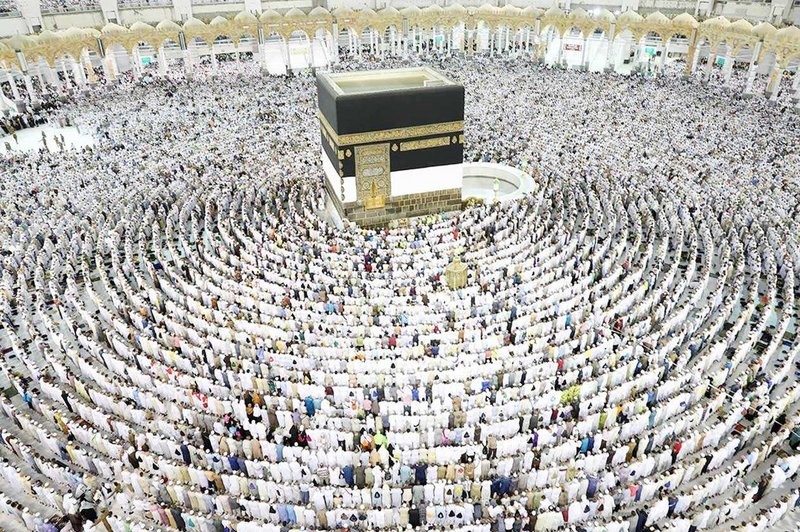Towards Meeting the Almighty – Part 2

The True Nature of Meeting the Almighty and the Meaning of Travelling Towards Him (2)
Seeking the Correct Answers (2)
As pointed out in the previous article, in order to correctly comprehend the idea of travelling towards and meeting the Almighty, we must first scrutinize two Quranic concepts: “Kadḥ” (Painstaking Movement) and “Mulāqāt” (Meeting). In our earlier discussion, we attempted to shed light upon the first of these key notions. Now, we shall move on to the second.
The Meeting
Souls in Motion
We have already clarified that any form of gradual change constitutes an instance of “movement”. Therefore, gradual change within the soul represents the soul’s motion. If this motion is directed towards God, then the person in question is indeed journeying towards the Almighty. Normally, when we use words such as “meeting”, we employ them in reference to two or more things that initially lie at a distance from one another and, subsequently, move towards each other until finally uniting at a single spot. Similarly, when the Holy Quran says, “…and you will surely meet Him (i.e. Your Lord)”[1] the idea being conveyed is that our current spiritual and existential position lies far away from the Almighty, and that, through laborious effort and movement, we will one day reach His divine presence. Interestingly, whenever the Quran mentions this phenomenon, it does so within sentences wherein the word “Lord” or “God” forms the object of an infinitive verbal noun signifying the concept of “meeting”. It is as if the Holy Quran wants to reiterate that the Almighty is the only universal constant, utterly steadfast and absolutely unchanging, and that we human-beings are essentially and existentially fluid and fluctuating, locked in a perpetual journey towards His Divine Entity. Secondly, we are the ones who are absent from His presence and therefore need to move towards Him in the spiritual and existential sense so as to finally meet Him, whereas the Almighty was never absent, and indeed cannot be absent, from His creation and, therefore, He has no need to move towards them. In fact, as Mulla Sadra explained, the essential yet involuntary movement of human-beings at the core of their very essence and existence cannot take place without the Almighty’s continuous and uninterrupted attention and connection. This is probably why the Holy Quran attributes the movement in question as well as the meeting that shall occur at its end to human-beings rather than to God.
A Universal Meeting and Those Prohibited From Divine Company
Based on the Quranic evidence at our disposal, this grand gathering of mankind in the Almighty’s presence is a phenomenon that shall occur on the Day of Judgement and shall be universal in nature i.e. every human soul shall find itself in solemn attendance in front of its Lord. However, verses within the Holy Quran also indicate that certain individuals will be prohibited from God’s company.
كَلَّا إِنَّهُمْ عَن رَّبِّهِمْ يَوْمَئِذٍ لَّمَحْجُوبُونَ
“Indeed, they will be alienated from their Lord on that day”[2]
As a result, we find ourselves facing an apparent conflict between these two sets of Quranic verses. One group declares mankind’s meeting with God to be a universal affair, where no soul shall be exempted, while the other group tells us that the obstinate transgressors and adamant disbelievers will be barred from experiencing this Divine company.
Human Perception Unleashed
How shall we resolve this matter? To present one probable answer to this query, we can focus upon the fact that “meeting” is not always synonymous to “seeing” or “communicating”. For example, when a blind person meets someone, he does indeed meet this person, and yet does not have any form of observation or visual contact. However, this answer seems to be insufficient because, according to the Holy Quran, the realm of the Hereafter is the realm wherein all veils and hindrances shall be removed and reality shall manifest itself in all its grandeur and glory. In the Quran’s perspective, obstacles to true knowledge and understanding are things that belong to this temporal and material world.
لَّقَدْ كُنتَ فِي غَفْلَةٍ مِّنْ هَٰذَا فَكَشَفْنَا عَنكَ غِطَاءَكَ فَبَصَرُكَ الْيَوْمَ حَدِيدٌ
“You were certainly oblivious of this. (Now) we have removed your veil from you, and so today your eyesight is acute”[3]
According to this Quranic verse, a group of people will be told that they languished in ignorance within their worldly lives with regards to these realities. Other people were also unable to see these truths, but this group in particular were worse off because their problem was not only the inability to see the truth but also their unwillingness to give any attention towards it. As a result, the Quran says that this group will respond by asking for another chance at life.
رَبَّنَا أَبْصَرْنَا وَسَمِعْنَا فَارْجِعْنَا نَعْمَلْ صَالِحًا إِنَّا مُوقِنُونَ
“Our Lord! We have seen and heard. Send us back so that we may act righteously. Indeed we are [now] convinced.”[4]
Only Voluntary Certitude Bears True Value
They shall admit their fault and shall confess that they heard God’s prophets deliver news of these realities but, nevertheless, chose to ignore all their arguments and warnings. However, with all veils removed and no limits to human perception, they now see the truth with their own eyes and, thus, wish to reconsider their previous erroneous judgements declaring, instead, their firm, although newly born, conviction to reality with utter and resolute certitude. This certitude, however, is totally devoid of value simply because it represents a conviction spawned by compulsion and necessity. Even if they had chosen to believe due to a similar compulsion during their worldly lives, this belief would also have been worthless. Indeed, if God had wanted, He could have removed all barriers, leaving people speechless in the face of undeniable signs of His might and sovereignty. As such, they would totally succumb and surrender to Him as a matter of necessity and compulsion, but this submission would in truth be empty of worth.
إِن نَّشَأْ نُنَزِّلْ عَلَيْهِم مِّنَ السَّمَاءِ آيَةً فَظَلَّتْ أَعْنَاقُهُمْ لَهَا خَاضِعِينَ
“If We so wished, We would send down to them a sign from the sky before which their heads will remain bowed in humility.”[5]
Indeed, the only conviction and certitude that bears significance is the one that is acquired voluntarily and freely, and is achieved through thought and deliberation, while having been affirmed and cemented through action and perseverance.
Being in God’s Presence, Yet Deprived of His Sublime Company
Thus, on the Day of Judgement, there shall surely be those who shall meet God but shall be deprived of His sublime attention. In a manner of speaking, they shall be in His presence, cognizant of the existence of His entity and glory, and yet unable to perceive or experience the delight of His company. The pain brought about by such a circumstance is unimaginable. Consider a person who is severely thirsty, in fact parched and dehydrated beyond measure. Now imagine this person present at a spring of clean and cool water. Now imagine him to be completely cognizant of the presence of this water, literally able to smell and feel its fresh and revitalizing coolness. Now imagine him totally unable to drink even a drop of this life saving and thirst quenching fluid.
However, if an individual is somehow unable to sense thirst, he will feel no yearning or longing for water, even though his body is in dire need of it. If we look at ourselves, we clearly find that people like us very rarely experience any kind of anguish as a result of being away from God’s spiritual proximity. Preoccupied by our superficial lives in this temporal world, we seldom feel any need or requirement to meet the Almighty. Nevertheless, once human-beings enter the Hereafter and perceive reality with all its depth and truth, they shall all automatically and completely understand their existential and essential need for God, while experiencing this comprehension with all their existence and with unparalleled passion and severity. At this point, the greatest imaginable desire and ecstasy for an individual would be to communicate with his Creator. This excruciating sense of boundless yearning shall be so extreme that it would overshadow any and all torments experienced by the said person through Hell-fire. When God wishes to speak about the severity of the punishment upon certain people, He indicates that He will refrain from looking at them or abstain from speaking to them on the Day of Judgement. Since this temporal world is not the place where a person may meet or converse with God, we humans do not feel the urgent need for either of these things. However, in the Hereafter, this need will not only make itself apparent, its realization will saturate the entirety of our entities, and if denied satisfaction, it will torture us in a manner incomparable to any other form of suffering or torment.
Why Can’t We Meet the Almighty in this World?
Here, we may raise a question regarding why a meeting with God cannot take place in this temporal and material world? The answer is simple: Human-beings must choose their paths in this worldly life through free-will and voluntary decision making. They must voluntarily choose the path and direction that leads them to development and perfection. This idea forms the very essence of the divine test for which our material world has been created. However, if all the truths and realities regarding religion were utterly undeniable, neither religious obligation nor divine assessment would make any sense. Everyone would literally see the truth in its totality, leaving no space for doubt or even temptation, and would automatically be compelled to act accordingly. This would run counter to the very philosophy of why this world was created in the first place. The material and temporal world exists so that people may reveal the inner-most fabric and core essence of their own entities through actions they perform based upon their own free-understanding and free-will.
الَّذِي خَلَقَ الْمَوْتَ وَالْحَيَاةَ لِيَبْلُوَكُمْ أَيُّكُمْ أَحْسَنُ عَمَلًا
“He, who created death and life that He may test you [to see] which of you is best in conduct.”[6]
Therefore, this world must intrinsically be intertwined with a certain level of ambiguity and constraints regarding knowledge so that the purpose behind mankind’s creation could be preserved. The Hereafter, on the other hand, spells the conclusion of this divine examination. As a result, the barriers and limitations designed into the very fabric of the material realm are rendered obsolete when a person moves on to the eternal domain and are, thus, gradually removed. People living in purgatory can see and experience things that are beyond the scope and capability of people living in this material sphere of existence. Although, there does sometimes exist people within this world who develop the faculty of seeing and experiencing things normally seen and experienced exclusively by the residents of the purgatory realm, but such individuals are rare exceptions.
The Outward and Inner Realities of All Things
Generally, the minds and senses of people in our world are limited to the apparent and outward manifestations of existence, while being completely ignorant with regards to the inner reality of things.
يَعْلَمُونَ ظَاهِرًا مِّنَ الْحَيَاةِ الدُّنْيَا وَهُمْ عَنِ الْآخِرَةِ هُمْ غَافِلُونَ
“They know just an outward aspect of the life of the world, but they are oblivious of the Hereafter.”[7]
For instance, a person who embezzles the wealth or property of an orphan and consumes it unjustly, will probably consider himself to be enjoying the spoils of his corruption, while in truth his is consuming Hell-fire.
إِنَّ الَّذِينَ يَأْكُلُونَ أَمْوَالَ الْيَتَامَىٰ ظُلْمًا إِنَّمَا يَأْكُلُونَ فِي بُطُونِهِمْ نَارًا ۖ وَسَيَصْلَوْنَ سَعِيرًا
“Indeed those who consume the property of orphans wrongfully, only ingest fire into their bellies, and soon they will enter the Blaze.”[8]
Surely and without doubt, people intoxicated by the material world are locked within a self-imposed form of ignorance. This ignorance is far worse than actual blindness.
Anyhow, the relationship between this world and the Hereafter is that of outward appearances to inner truth. On the Day of Judgement, veils and barriers to perception will be removed.
يَوْمَ تُبْلَى السَّرَائِرُ
“On the day when the secrets are revealed.”[9]
Similarly, everything buried deep within an individual’s heart and soul will also be rendered visible.
يَوْمَ هُم بَارِزُونَ ۖ لَا يَخْفَىٰ عَلَى اللَّهِ مِنْهُمْ شَيْءٌ
“The day when they will emerge [from their graves], nothing about them will be hidden from Allah.”[10]
وَبَرَزُوا لِلَّهِ جَمِيعًا
“Together they will be revealed before Allah.”[11]
Therefore, our present lives are such that there exists a heavy curtain between us and reality in its complete sense. Nonetheless, we are continuously moving towards the Hereafter with great speed, and with great anguish and pain.
لَقَدْ خَلَقْنَا الْإِنسَانَ فِي كَبَدٍ
“Certainly We created man in travail.”[12]
Indeed, this world is a place of suffering, a realm of limitation, scarcity and conflict. Whereas Paradise signifies a realm where suffering is meaningless and pain does not exist.
Another instance of absolute reality that will be made totally clear on the Day of Judgement is the matter of sovereignty and power. In this world, we are faced with many centers of power and authority, but when truth reveals itself in the Hereafter, we will incisively perceive that this plurality of sovereignty was nothing but a laughable delusion and fantasy.
لِّمَنِ الْمُلْكُ الْيَوْمَ ۖ لِلَّهِ الْوَاحِدِ الْقَهَّارِ
“To whom does the sovereignty belong today? To Allah, the One, the All-paramount!”[13]
There exists only one center of power and authority, and only one unitary and absolute focal point of sovereignty. Without exception, everything and everyone else is firmly within the grasp and clutches of this Omni-Dominant Hegemon. On the Day of Judgement, it will become utterly clear that the control of all our affairs and circumstances lies exclusively with Allah, and that no one else bears any influence or bearing upon anything.
In summary, this world is not a place where human-being may meet God, even though God exists here just as He exists everywhere.
وَلِلَّهِ الْمَشْرِقُ وَالْمَغْرِبُ ۚ فَأَيْنَمَا تُوَلُّوا فَثَمَّ وَجْهُ اللَّهِ ۚ إِنَّ اللَّهَ وَاسِعٌ عَلِيمٌ
“To Allah belong the east and the west: so whichever way you turn, there is the face of Allah! Allah is indeed all-bounteous, all-knowing.”[14]
Our meeting with the Almighty shall take place in the Hereafter. In that world, some individuals will find themselves blessed with divine attention and conversation. This experience will be so intense and euphoric in nature that these people will totally forget their own selves. On the other hand, there will also be people who shall yearn for God’s attention but will find themselves denied, and will suffer unimaginable torment due to this prohibition which is a result of their own criminal actions and villainy.
The Meaning of Travelling Laboriously Towards God
Based on our discussion thus far, we can interpret the Quranic verse that says: ““O man! You are laboring toward your Lord laboriously, and you will surely meet Him”[15] by saying that this verse seeks to communicate to us that human life and existence is, in reality, a journey. We are born into a world that is essentially and intrinsically in motion. Indeed, its core fabric is movement itself. If everything was constant and stagnant, journey and movement in our lives would also be meaningless. Thus, this entire world is nothing but motion and change at its fundamental and existential level. We are sent into this material world so that we may find ourselves in a circumstance suitable for and conducive to existential movement and development, for if we existed within a stagnant and motionless realm then such a situation would have rendered us incapable to any movement as well. Nevertheless, a crucial point to remember is that all movement and motion is unwaveringly towards God.
أَلَا إِلَى اللَّهِ تَصِيرُ الْأُمُورُ
“Indeed all matters return to Allah!”[16]
[1] The Holy Quran, Surah al-Inshiqāq, Verse 6
[2] The Holy Quran, Surah al-Muṭaffifīn, Verse 15
[3] The Holy Quran, Surah Qāf, Verse 22
[4] The Holy Quran, Surah al-Sajdah, Verse 12
[5] The Holy Quran, Surah al-Shu’arā, Verse 4
[6] The Holy Quran, Surah al-Mulk, Verse 2
[7] The Holy Quran, Surah al-Rūm, Verse 7
[8] The Holy Quran, Surah al-Nisā, Verse 10
[9] The Holy Quran, Surah al-Ṭāriq, Verse 9
[10] The Holy Quran, Surah Ghāfir, Verse 16
[11] The Holy Quran, Surah Ibrāhīm, Verse 21
[12] The Holy Quran, Surah al-Balad, Verse 4
[13] The Holy Quran, Surah Ghāfir, Verse 16
[14] The Holy Quran, Surah al-Baqarah, Verse 115
[15] The Holy Quran, Surah al-Inshiqāq, Verse 6
[16] The Holy Quran, Surah al-Shūrā, Verse 53


